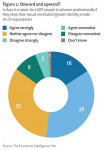Outsourcing and offshoring of innovation set to increase despite concerns over loss of control, Economist Intelligence Unit finds
While disaggregating R&D globally has advantages in terms of greater efficiency, speed to market and access to talent, respondents also recognise that there are challenges associated with the global innovation network model. Sixty percent of respondents cite loss of control as being a key concern with a more open approach to R&D. Similarly, 44% point to fears about the theft of intellectual property as being a significant risk to adopting a global innovation network model.
These results form part of Sharing the Idea: The Emergence of Global Innovation Networks, a new survey and report by the Economist Intelligence Unit sponsored by Ireland’s inward investment agency, IDA Ireland.
“Increased competition, the cost and complexity of innovation and a surplus of ideas are encouraging many companies to restructure their approach to research and development,” says Rob Mitchell, editor of the report. “Our survey shows a considerable shift towards greater outsourcing and offshoring of R&D in what we term a global innovation network model, despite concerns about loss of control over a function that is often considered core to a company’s identity.”
"The trend towards companies building global innovation networks is something that we in Ireland have recognised as an important development,” says Sean Dorgan, CEO of IDA Ireland. “As companies collaborate more closely with external and international partners, including universities and research centres, there is much to be gained for countries around the world that can offer strong innovation skills and capabilities to leading global organisations."
Other key findings of the report include:
Companies face a pincer movement on costs. Among respondents questioned for this survey, 77% say that the cost of innovation has increased over the past three years, while 82% think that complexity has increased over the same period. Meanwhile, R&D departments face strong pressure to curb expenditure on the innovation process. Fully 70% say that their management sees investment in R&D as vital to success, but are also putting the R&D function under increasing pressure to curb costs.
The search for talent is becoming more intense. Shortages of specialist talent in their home countries are encouraging companies to look further afield to destinations where skills are both in greater supply and more affordable. When asked what they look for in an offshoring location for research and development (R&D), companies rank “access to qualified staff” most highly (61% say it is very important), followed by local labour costs and access to first-rate universities.
The customer is key to successful innovation. There is widespread agreement that the development of successful ideas requires companies to learn more about what customers want and to calibrate overall strategy accordingly. Of those surveyed, 75% say they agree with the view that customers are becoming an increasingly important source of innovation. Similarly, 54% involve customers in the innovation process and 50% regard customers as an important type of external partner in R&D.
Sharing the Idea: The Emergence of Global Innovation Networks is available free to download at www.eiu.com/Sharingtheidea
Notes for editors
About the report
Sharing the Idea: The Emergence of Global Innovation Networks is an Economist Intelligence Unit report, sponsored by the Investment Development Agency of Ireland. The Economist Intelligence Unit’s editorial team conducted the interviews on which the analysis is based and wrote the report. The survey consisted of 300 senior executives from industries that have extensive research and development interests.
About the Economist Intelligence Unit
The Economist Intelligence Unit is the world leader in global business intelligence. It is the business-to-business arm of The Economist Group, which publishes The Economist newspaper. The Economist Intelligence Unit provides geopolitical, economic and business analysis on more than 200 countries, as well as strategic intelligence on key industries and management practices. With over 300 full-time professionals in 40 offices around the world, supported by a global network of more than 700 contributing analysts, the Economist Intelligence Unit is widely known for its unparalleled coverage of major and emerging markets. More information about the Economist Intelligence Unit can be found at www.eiu.com.
웹사이트: http://www.eiu.com
연락처
Edgar Fernandez
Marketing Manager, Asia-Pacific
(852) 2585 3826 이메일 보내기
Fax: (852) 2802 7007
이 보도자료는 Economist Intelligence Unit가(이) 작성해 뉴스와이어 서비스를 통해 배포한 뉴스입니다. 뉴스와이어는 편집 가이드라인을 준수합니다.




